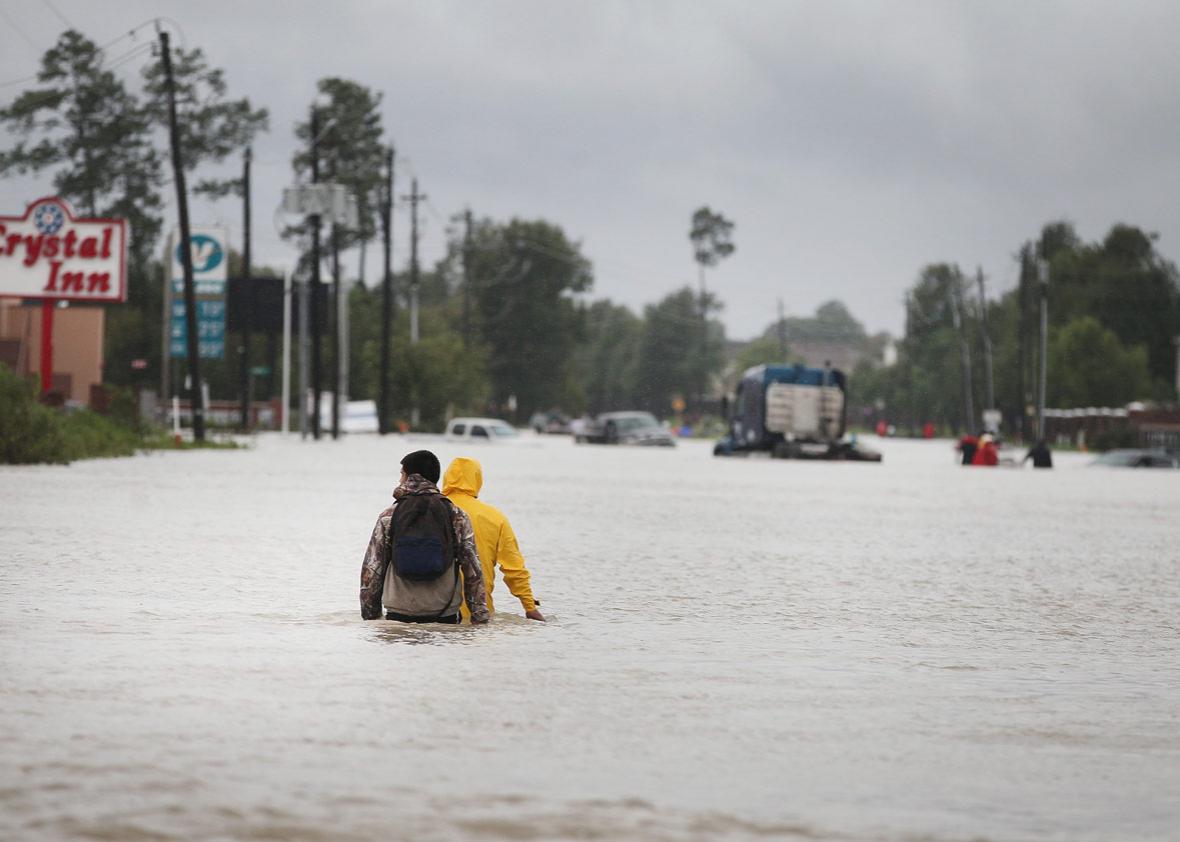Members of Congress were set to enjoy a light schedule in September. All they had to do was fund the federal government, raise the debt ceiling, reauthorize the children’s health insurance and national flood insurance programs, pass a defense authorization bill and maybe a health insurance market stabilization bill, and continue work on a new fiscal year budget resolution and comprehensive restructuring of the American tax code. What an opportune time, then, for 51 inches of rain to fall on America’s fourth-largest city and require emergency appropriations of billions of federal dollars.
The Harvey aid, though, may not just be one more difficult thing on the long list of items Congress has to deal with in a few weeks’ legislative time. It could serve as the ingredient leaders need to blow through other must-pass obstacles.
This revelation appears to have already dawned on Capitol Hill leaders, who floated to Politico Wednesday morning the tactic of rolling the debt-ceiling hike, government funding, and Harvey relief measures together into a single mega-bill. “The idea,” Politico writes, “is this package would create an undefeatable constituency across the Capitol.” And its reach would extend beyond the Capitol, too. The relief funds also could provide a convenient, if temporary, face-saving measure for the chief executive who’s backed himself into a corner with a recent shutdown threat.
As many hypocrisy-watchers have noted this week, several conservatives opposed, or demanded matching spending cuts, for a Hurricane Sandy relief package. But that was easy for them to do since Barack Obama was calling for it and the funds were benefiting blue Northeast states. Now those funds will be tagged for Texas and its formidable Republican delegation in Congress.
In the House, Texas Republicans are not only the largest GOP delegation of any state, but also the most powerful one. Their representatives chair the Ways and Means, Financial Services, Homeland Security, Agriculture, and Rules committees, serve as influential “cardinals” over several appropriations subcommittees, and hold senior positions on the powerful Energy and Commerce Committee. They will get their relief funds, as they should, and they will make for a potent intracaucus lobbying force.
In the Senate, one Texan—Sen. John Cornyn—is the No. 2–ranking member of the chamber. But it’s the junior Texan, Sen. Ted Cruz, who seems more influential here. Cruz is running for re-election and needs that relief money. We shouldn’t underestimate his capacity for throwing wrenches into legislative processes, but he is shrewd enough to pick his fights. In a world where a huge hurricane hadn’t just devastated his state, Cruz might be linking with the House Freedom Caucus to demand extractions over raising the debt ceiling. In this one, Cruz will be more willing to go along with a clean debt-ceiling hike and clean funding bill to secure the Harvey relief dollars to which his political fate is tied.
And then there’s our president, so desperate for a “win” that just last week he was threatening to shut down the government if Congress wouldn’t appropriate money for his border wall in September. The Harvey relief package, though, presents Trump with an opportunity to get a whole other sort of “win”: one that’s quite achievable, and without much drama.
Trump enjoys playing Mr. Hurricane Fixer Man. You can tell this by reading reported accounts of, or just by watching his body language during, his Texas visit on Tuesday. He likes putting on his little rain jacket and directing emergency meetings from the head of the table and waving the Texas flag around before his massive hurricane crowds. He plans to return to Texas again soon. He loves this.
He may love it so much that he’s willing to make securing the relief funds his main objective in September. Though most presidents wouldn’t treat the passage of disaster relief funds as a crowning legislative achievement, Trump will absolutely do that. He will never shut up about it. He will throw several parades for himself in the Houston area. He will begin referring to himself, daily, as The Savior of Texas. And that’s fine. If that’s what it takes for him to forget about the wall for a while and stop threatening to shut down the government over money for it, he should go wild.
None of this will be as easy as I just laid it out. As Politico writes in its report on the theoretical mega-bill, “expect at least one or two hiccups along the way. Typically whatever leadership starts with isn’t the package that ends up passing, particularly in the House.” Some members of the House Freedom Caucus, specifically, have threatened that Ryan’s job would be on the line if he brought a clean debt-ceiling increase to the floor.
But Harvey might be changing the entire view of September’s battles. North Carolina Rep. Mark Meadows, the Freedom Caucus chair, made an interesting admission to Politico on Wednesday. Though the group has been among Trump’s strongest supporters in pushing for a border wall fight this September—perhaps to flatter Trump into supporting their other priorities—Meadows said that the “majority” of Freedom Caucus members he’s spoken to would probably support a stopgap bill that didn’t fund the wall. “He emphasized that he’s supportive of the wall,” Politico writes, “but wants to avoid a shutdown fight amid federal relief efforts in Houston.” (At the very least, the House will be rewriting its pre-Harvey proposal to fund the wall via cuts to … disaster relief.)
Maybe all three items will be bundled together, or maybe it will be some other configuration. The bigger picture, though, is that even the Freedom Caucus recognizes that Harvey could take the fire out of some of September’s most high-stakes showdowns.
